
New to Title IX
Title IX: The Basics
• 39 words • Cannot discriminate on the basis of sex in education programs receiving federal funds
• Designate Title IX Coordinator
• Policies and Procedures
• Notice: Prompt, Equitable, Appropriate Response

50 Years of Title IX History
In Under Five Minutes
• Modeled after Title VI. Original concern was employment and admissions practices of universities.
• Impact on athletics became apparent early on and proponents beat back repeated attempts to water down legislation.
• Historically, regulatory agencies (HEW and ED) have been lackluster in enforcement.
• Changed significantly with Obama Administration.
Obama Administration OCR
• Issued 2011 Dear Colleague Letter
• Ramped up Title IX program compliance reviews
• Created “list of shame”
• Was not deferential
• As a result, schools for first time in Title IX’s history took extraordinary steps to comply and ceased handling cases informally
• Disciplined students begin aggressively challenging institutions
• VAWA is reauthorized with Clery amendments




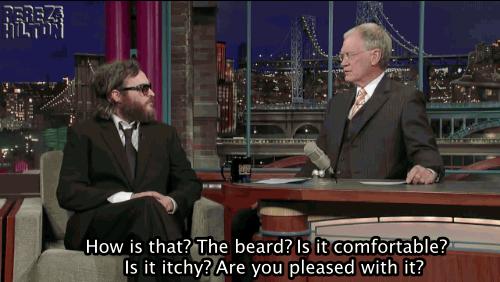

Cannon v. University of Chicago (1979): Facts
• Geraldine Cannon was a nurse at Skokie Valley Hospital, the wife of a Chicago lawyer, and the mother of five children aged 12 to 21.
• Lifelong dream was to become a doctor. It was a dream that was rekindled when her youngest child started elementary school and Cannon finally had the opportunity to return to school as a full -time student at Trinity College.
• Graduated with honors at age 39 and began applying to medical schools, including Univ. of Chicago’s Pritzker School of Medicine.
• Cannon was denied admission in 1975.
Cannon v. University of Chicago: Supreme Court
• “This case presents as a matter of first impression the issue of whether Title IX of the Education Amendments 1972 may be enforced in a federal civil action . . . .”
• Private cause of action was necessary to ensure that the “sweeping promise of Congress” to end sex discrimination in education was more than “merely an empty promise.”
• “Is [Title IX] an empty promise or will it be enforced and for the present, it simply must be enforced by the courts or it's not going to be enforced at all.”

Cannon v. University of Chicago: Supreme Court
• 6-3 opinion crafted by Justice John Paul Stevens & included Justices Brennan & Rehnquist
• Holding: There is an implied cause of action for individuals to sue under Title IX.
• Title IX was patterned after Title VI and that “when Title IX was enacted, the critical language in Title VI had already been construed as creating a private remedy.”
• The Supreme Court also accepted the argument advocated by John Cannon and also HEW that private enforcement was necessary to effectuate the purposes of the law.
Franklin v. Gwinnett County (1992): Facts
• Christine Franklin was a student at North Gwinnett High School between September 1985 and August 1989. Franklin was subjected to continual sexual harassment beginning in the autumn of her tenth-grade year (1986) from Andrew Hill, a coach and teacher employed by the district.
• The complaint further alleges that though they became aware of and investigated Hill's sexual harassment of Franklin and other female students, teachers and administrators took no action to halt it and discouraged Franklin from pressing charges against Hill.
• Hill ultimately resigned on condition that all matters pending against him be dropped. The school thereupon closed its investigation.

Franklin v. Gwinnett County: Issue & Holding
• Issue: Does Title IX implied right of action support a claim for monetary damages?
• Unanimous holding: “[W]e conclude that a damages remedy is available for an action brought to enforce Title IX.”

But . . .


Gebser v. Lago Vista Indep. School District (1998)
• Gebser was assigned to classes taught by Waldrop. While visiting her home, Waldrop kissed and fondled Gebser. They had sexual intercourse on a number of occasions.
• In January 1993, police discovered Waldrop and Gebser engaging in sexual intercourse and arrested Waldrop.
Lago Vista immediately terminated his employment.
• School district did not have an official grievance procedure for lodging sexual harassment complaints; nor had it issued a formal anti -harassment policy.

Gebser: Plaintiff’s Argument
• Gebser and DOJ claimed that liability should be evaluated using the same standards plaintiffs use in employment sex harassment cases under Title VII.
• A “teacher is ‘aided in carrying out the sexual harassment of students by his or her position of authority with the institution,’ irrespective of whether school district officials had any knowledge of the harassment and irrespective of their response upon becoming aware.”
• Alternatively, a school should be “liable for damages based on a theory of constructive notice, i.e., where the district knew or ‘should have known’ about harassment but failed to uncover and eliminate it.”
Gebser: The Rule
• An "appropriate person" . . . is, at a minimum, an official of the recipient entity with authority to take corrective action to end the discrimination.
• “Consequently, in cases like this one that do not involve official policy of the recipient entity, we hold that a damages remedy will not lie under Title IX unless an official who at a minimum has authority to address the alleged discrimination and to institute corrective measures on the recipient's behalf has actual knowledge of discrimination in the recipient's programs and fails adequately to respond.”
• “[T]he response must amount to deliberate indifference to discrimination.”
Jackson v. Birmingham Bd. of Ed. (2005)
• Roderick Jackson, a teacher in the Birmingham, Alabama, public schools, complained about sex discrimination in the high school’s athletic program and was retaliated against.
• Sued pursuant to Title IX
• Does Title IX prohibit retaliation? Yes.




Davis v. Monroe County Board of Education (1999): Holding
• “We consider here whether the misconduct identified in Gebser ─deliberate indifference to known acts of harassment─ amounts to an intentional violation of Title IX, capable of supporting a private damages action, when the harasser is a student rather than a teacher. We conclude that, in certain limited circumstances, it does.”
• Recipients of federal funding may be liable “where the recipient is deliberately indifferent to known acts of student-on-student sexual harassment and the harasser is under the school's disciplinary authority.”
Davis: Majority Decision
• “School administrators will continue to enjoy the flexibility they require so long as funding recipients are deemed ‘deliberately indifferent’ to acts of student-on-student harassment only where the recipient's response to the harassment or lack thereof is clearly unreasonable in light of the known circumstances.”
• “The recipient must merely respond to known peer harassment in a manner that is not clearly unreasonable. This is not a mere ‘reasonableness’ standard, as the dissent assumes. In an appropriate case, there is no reason why courts, on a motion to dismiss, for summary judgment, or for a directed verdict, could not identify a response as not ‘clearly unreasonable’ as a matter of law.”


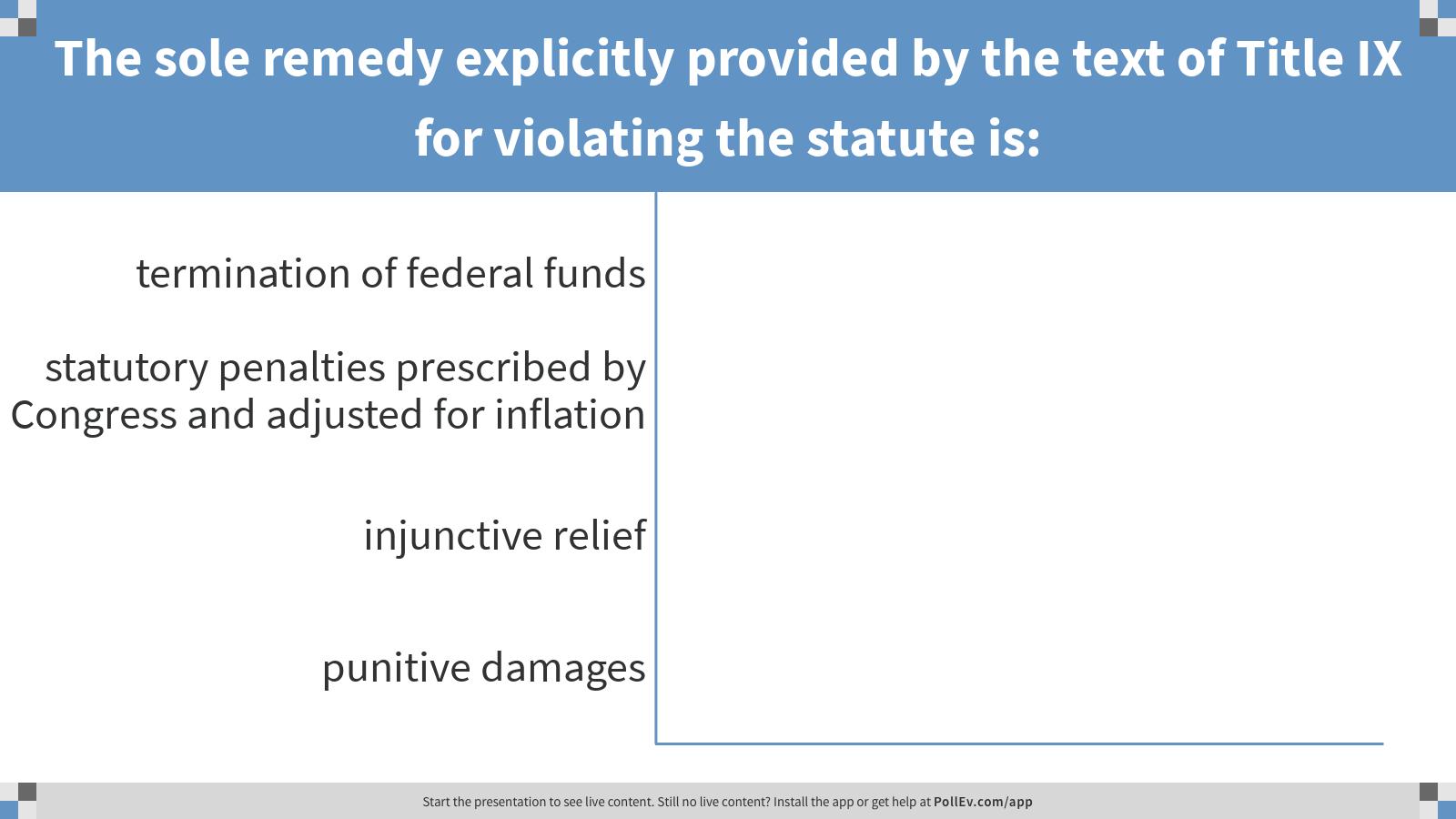
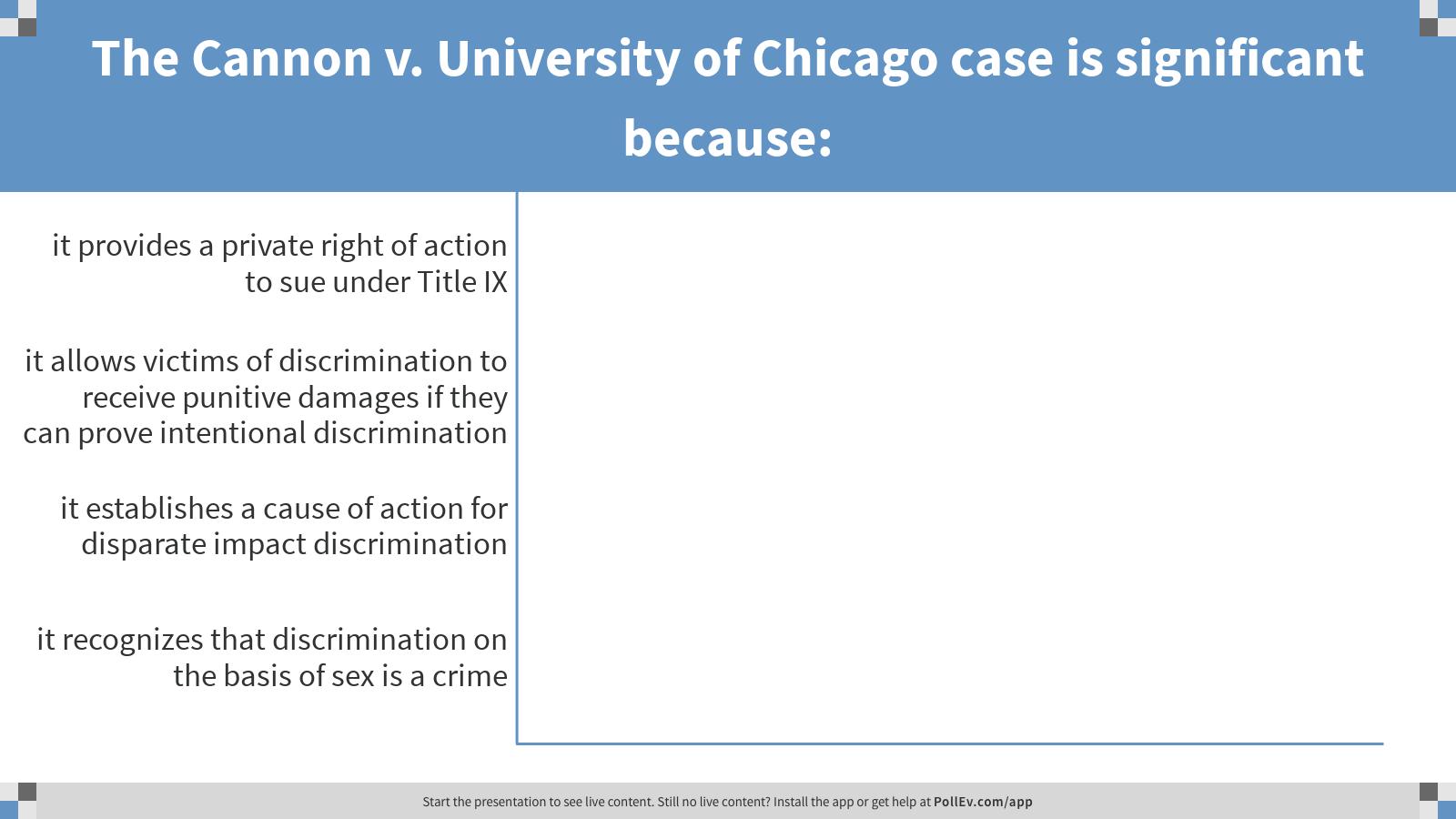



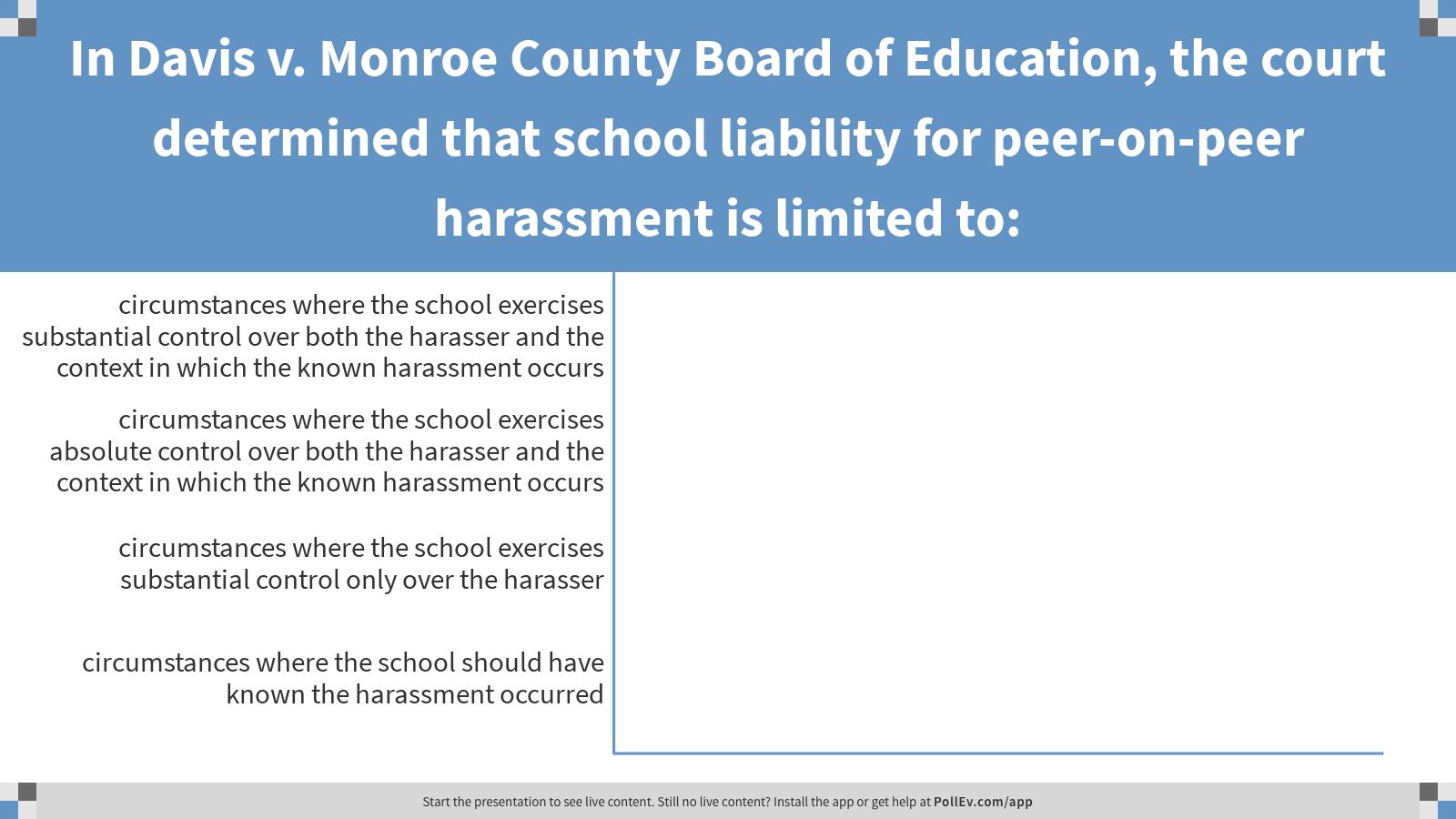
Lakoski v. James (5th Cir. 1995)
• Dr. Lakoski denied tenure
• Sues under Title IX as opposed to Title VII –why?
• Wins jury trial and $150,000 in damages plus attorney fees
• University appealed claiming that Title IX does not provide a private right of action for employment discrimination.
“Given the availability of a private remedy under Title VII for aggrieved employees, we are unwilling to follow Dr. Lakoski's beguilingly simple syllogism that Cannon, Bell, and Franklin all add up to an implied private right of action for damages under Title IX for employment discrimination. Doing so would disrupt a carefully balanced remedial scheme for redressing employment discrimination by employers . . . .”
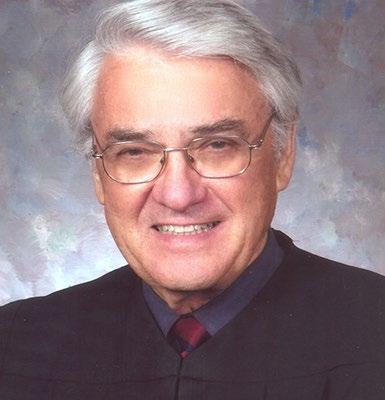
Intersection of IX and VII
• In an employment discrimination case, which applies? Perhaps both
• For now, “bells and whistles” don’t apply to VII cases
• Title VII expects an employer to cure and address unwelcome sexual conduct before it creates an actionable hostile environment
• Retaliation
• Approach?
Hypothetical 1
• Student accuses faculty member of making inappropriate sexual comments in class
• How do you handle?
Hypothetical 2
• Athletics employee on Performance Improvement Plan files a complaint with HR about lack of resources for women’s athletics
• How do you handle?
Hypothetical 2A
• Athletics employee on Performance Improvement Plan files a complaint with HR about lack of resources for women’s athletics
• AD wants to terminate
• How do you handle?
SB 212 Key Points
1. Broad mandatory reporting obligation for all employees
2. Mandatory reporting obligation to the president and the board
3. Confidentiality
SB 212: Mandatory Reporting
• Requires employees to “promptly report” certain incidents “to the institution’s Title IX coordinator or deputy Title IX coordinator.”
• Trigger? When an “employee of a postsecondary educational institution” “witnesses or receives information” regarding an incident that “the employee reasonably believes constitutes sexual harassment , sexual assault, dating violence, or stalking” which was allegedly committed by or against “a student enrolled at or an employee of the institution at the time of the incident.”
• Reporting obligation exists when the employee witnesses or receives information “in the course and scope of [the employee’s] employment.”
SB 212: Mandatory Reporting
• Who is an “employee”? Does not include “a student enrolled at the institution.” Exception appears to only apply to traditional student-workers.
• No language suggesting that the reporting requirement applies to volunteers, agents, or other non-employees.
• Employees who are “victims of sexual harassment, sexual assault, dating violence, or stalking” are not required to report incidents involving themselves.
• Employees who learn about reportable incidents “at a . . . public awareness event sponsored by a postsecondary educational institution or by a student organization affiliated with the institution” are not required to report those incidents.
SB 212: Mandatory Reporting

• If a school determines that an employee failed to satisfy their mandatory reporting requirement, the school would be required to terminate that employee “in accordance with the institution’s disciplinary procedure.”
• Yes, even tenured faculty members
What Must Be Included in Report?
• “All information concerning the incident known to the reporting person that is relevant to the investigation.”
• Report must also note, “if applicable, redress of the incident, including whether an alleged victim has expressed a desire for confidentiality in reporting the incident.”
• Exceptions: employee who (1) has been “designated by the institution as a person with whom students may speak confidentially concerning sexual harassment, sexual assault, dating violence, or stalking” or (2) “receives information regarding such an incident under circumstances that render the employee’s communications confidential or privileged under other law.”
• Not immune from the reporting requirement. Must provide “only the type of incident reported,” which cannot “include any information that would violate a student's expectation of privacy.”
HB 1735 Key Points
1. Adopt policy with required components
2. Board must approve policy & changes to policy
3. Required prevention programming
4. Disciplinary process requirements
5. Training requirements
6. Confidentiality
7. Unprecedented administrative enforcement
Respondent Litigation: The Basics
• “Due Process”
• Title IX (“Erroneous Outcome”: Doubt + Gender Bias)
• Breach of Contract
• Other Tort Claims
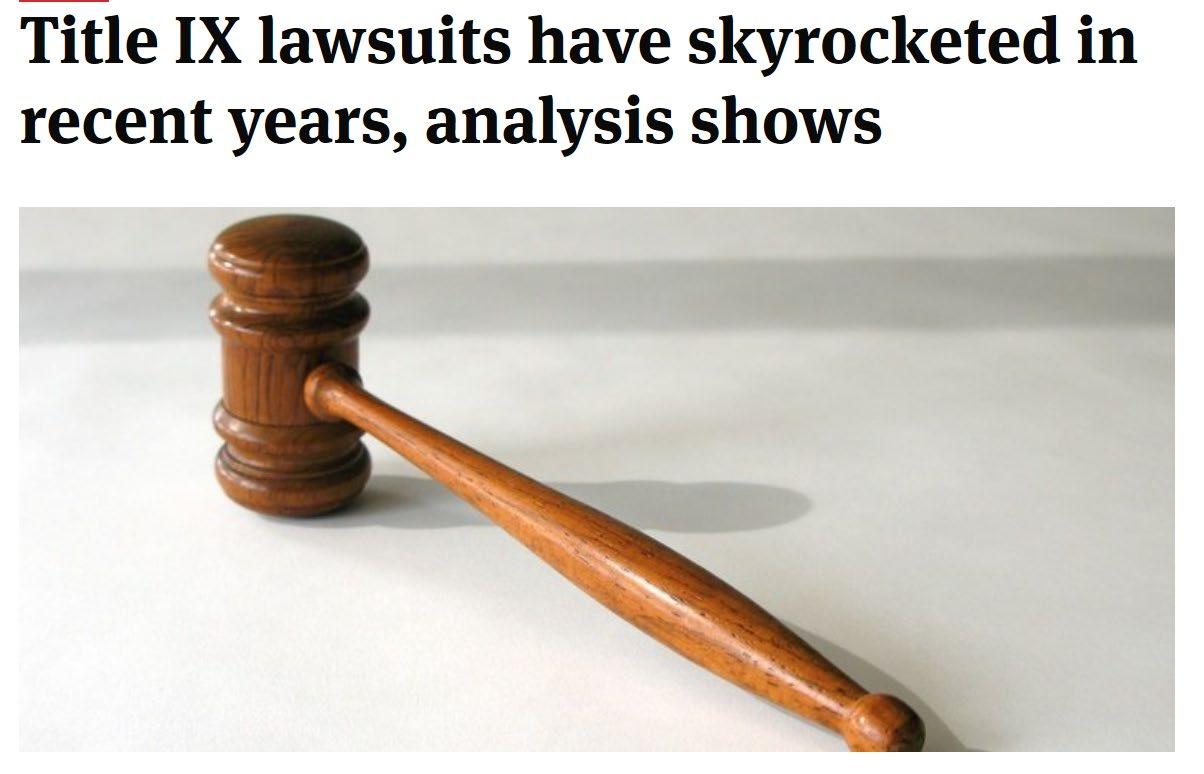
QUESTIONS?

Summary of Proposed Title IX Regulations

Regulatory Update
• On June 23, 2022, the Department of Education released its Title IX Notice of Proposed Rulemaking
• 700-plus pages, responds to changes in Title IX regulations imposed in August 2020
• 60 days for public comments (September 12, 2022?)
• When effective?

© 2022 Husch Blackwell LLP


Obama Administration OCR
• Issued 2011 Dear Colleague Letter
• Ramped up Title IX program compliance reviews
• Created “list of shame”
• Was not deferential
• As a result, schools for first time in Title IX’s history took extraordinary steps to comply and ceased handling cases informally
• Did pendulum swing too far?
• Disciplined students begin aggressively challenging institutions -- backlash

© 2022 Husch Blackwell LLP

© 2022 Husch Blackwell LLP

Overview of Proposed Regulations
1. Mix of provisions from the 2011 OCR Dear Colleague Letter, the 2020 Title IX regulations (currently in place) and some new provisions.
2. Not a return to 2011 – attempt to balance complainants’ rights and the rights of those who are accused.
3. Modest return to long history of institutional discretion with process (from elimination of virtually all administrative discretion to discretion with guardrails)
4. With discretion comes challenging choices
© 2022 Husch Blackwell LLP

Texas Law Reminder
Institutional policy on sexual harassment, sexual assault, dating violence, and stalking must (1) “be approved by the institution’s governing board before final adoption by the institution” and (2) be reviewed at least “each biennium” and, “with approval of the institution’s governing board, revise the policy as necessary.” §51.282(c).
© 2022 Husch Blackwell LLP

Question 1: What to do now?
• Begin draft of updated policy based on proposed regulations?
• Educate leadership and board?
• Seek buy-in/input from stakeholders in areas where there is discretion
© 2022 Husch Blackwell LLP
Coordinator Responsibility Under Proposed Regs
“A recipient must:
(1)Require its Title IX Coordinator to monitor the recipient’s education program or activity for barriers to reporting information about conduct that may constitute sex discrimination under Title IX; and
(2)Take steps reasonably calculated to address such barriers.”
Be sure to document your efforts in this regard.
© 2022 Husch Blackwell LLP
Examples of Monitoring
Annual or biannual campus climate surveys
Targeted feedback from students and employees who have reported or made complaints about sex discrimination
Public awareness events for purposes of receiving feedback from student and employee attendees,
Publicizing and monitoring an email address designated for anonymous feedback about reporting barriers.
© 2022 Husch Blackwell LLP
Scope of Proposed Regs Coverage
• Applies to all claims of sex discrimination
• Explicitly includes as forms of sex discrimination under Title IX: discrimination based on pregnancy, sexual orientation, gender identity, sex stereotypes, or sex characteristics (*this will trigger a challenge)
• Proposed regulations’ explicit definition of discrimination on the basis of gender identity: “different treatment or separation on the basis of sex in a way that would cause more than de minimis harm, including by adopting a policy or engaging in a practice that prevents a person from participating in an education program or activity consistent with their gender identity.”
• Athletics: Stay tuned . . .
© 2022 Husch Blackwell LLP
Hostile Environment
• Subtly modifies the definition of hostile environment sexual harassment to align with Title VII (and Texas law).
• Unwelcome sex-based conduct that is sufficiently severe or pervasive, that, based on the totality of the circumstances and evaluated subjectively and objectively, denies or limits a person’s ability to participate in or benefit from an education program or activity.
• Problematic: No guidance on potential tension between definition and institutional free speech obligations.
© 2022 Husch Blackwell LLP
Retaliation: A Broad Definition
• “Retaliation means intimidation, threats, coercion, or discrimination against any person by a student, employee, person authorized by the recipient to provide aid, benefit, or service under the recipient’s education program or activity, or recipient for the purpose of interfering with any right or privilege secured by Title IX . . . or because the person has reported information, made a complaint, testified, assisted, or participated or refused to participate in any manner in an investigation, proceeding, or hearing under this part . . . .”
© 2022 Husch Blackwell LLP
Retaliation
• “A recipient must prohibit retaliation in its education program or activity. When a recipient receives information about conduct that may constitute retaliation, the recipient is obligated to comply with § 106.44. A recipient must initiate its grievance procedures upon receiving a complaint alleging retaliation under § 106.45.”
• “Prohibited retaliation includes but is not limited to:
a. Initiating a disciplinary process against a person for a code of conduct violation that does not involve sex discrimination but arises out of the same facts and circumstances as a complaint or information reported about possible sex discrimination, for the purpose of interfering with the exercise of any right or privilege secured by Title IX or this part; or
b. Peer retaliation.”
© 2022 Husch Blackwell LLP
Question 2
• What are examples of peer retaliation?
• How will institution assess?
© 2022 Husch Blackwell LLP
Jurisdictional Scope
• Harassment occurring outside of an educational program or activity can nevertheless violate Title IX if such harassment contributes to a hostile environment within an educational program or activity.
• Conduct occurring within an institution’s education program and activity includes conduct that occurs off-campus when the respondent represents the institution or is otherwise engaged in conduct under the institution’s “disciplinary authority.”
• Net effect: End of bifurcated processes?
© 2022 Husch Blackwell LLP
Reminder: Texas Law On Mandatory Reporting
• SB 212’s employee reporting obligation is triggered when an “employee of a postsecondary educational institution” “witnesses or receives information” regarding an incident that “the employee reasonably believes constitutes sexual harassment, sexual assault, dating violence, or stalking” which was allegedly committed by or against “a student enrolled at or an employee of the institution at the time of the incident.”
• The employee reporting obligation only exists, though, when the employee witnesses or receives information regarding sexual harassment, sexual assault, dating violence, or stalking “in the course and scope of [the employee’s] employment.”
• If a school determines that an employee failed to satisfy their mandatory requirement, the school would be required to terminate that employee “in accordance with the institution’s disciplinary procedure.”
© 2022 Husch Blackwell LLP
New Broad Mandatory Reporting Requirements
• “Any employee who is not a confidential employee and who has authority to institute corrective measures on behalf of the recipient to notify the Title IX Coordinator when the employee has information about conduct that may constitute sex discrimination under Title IX”
• “Any employee who is not a confidential employee and who has responsibility for administrative leadership, teaching, or advising in the recipient’s education program or activity to notify the Title IX Coordinator when the employee has information about a student being subjected to conduct that may constitute sex discrimination under Title IX”
© 2022 Husch Blackwell LLP
New Mandatory Reporting Requirements
• “Any employee who is not a confidential employee and who has responsibility for administrative leadership, teaching, or advising in the recipient’s education program or activity and has information about an employee being subjected to conduct that may constitute sex discrimination under Title IX to either:
Notify the Title IX Coordinator when the employee has information about an employee being subjected to conduct that may constitute sex discrimination under Title IX; or
Provide the contact information of the Title IX Coordinator and information about how to report sex discrimination to any person who provides the employee with the information”
© 2022 Husch Blackwell LLP
New Mandatory Reporting Requirements
“All other employees who are not confidential employees, if any, to either:
Notify the Title IX Coordinator when the employee has information about conduct that may constitute sex discrimination under Title IX; or
Provide the contact information of the Title IX Coordinator and information about how to report sex discrimination to any person who provides the employee with information about conduct that may constitute sex discrimination under Title IX.”
© 2022 Husch Blackwell LLP
Confidential Employees
• Employees whose communications are privileged under law and are associated with their role or duties for the institution;
• Employees whom the institution has designated as a confidential resource for the purpose of providing services to individuals in connection with sex discrimination; and
• Employees of postsecondary institutions who conduct human subjects research studies that have been approved by the institution’s Institutional Review Board and that are designed to gather information about sex discrimination.
© 2022 Husch Blackwell LLP
Texas Confidential Employees
• Texas law provides a significant caveat to this reporting requirement for an employee who (1) has been “designated by the institution as a person with whom students may speak confidentially concerning sexual harassment, sexual assault, dating violence, or stalking” or (2) “receives information regarding such an incident under circumstances that render the employee’s communications confidential or privileged under other law.”
• Texas law requires employees in either of these two categories to provide “only the type of incident reported,” which cannot “include any information that would violate a student's expectation of privacy.”
© 2022 Husch Blackwell LLP
Question 3
• What are some approaches to reconcile the mandatory reporting obligations in both statutes?
• Will failure to make mandatory IX report result in termination?
• How to memorialize in policy and training?
• What will be impact on “actual knowledge” argument?
© 2022 Husch Blackwell LLP
New(ish) Mandatory Training
“All employees must be trained on:
i. The recipient’s obligation to address sex discrimination in its education program or activity;
ii. The scope of conduct that constitutes sex discrimination under this part, including the definition of sex-based harassment; and
iii. All applicable notification and information requirements under §§ 106.40(b)(2) and106.44.”
© 2022 Husch Blackwell LLP
New(ish) Mandatory Training
“all investigators, decisionmakers, and other persons who are responsible for implementing the recipient’s grievance procedures or have the authority to modify or terminate supportive measures under § 106.44(g)(4) must be trained on the following topics to the extent related to their responsibilities:
i. The recipient’s obligations under § 106.44*;
ii. The recipient’s grievance procedures under § 106.45, and if applicable § 106.46;
iii. How to serve impartially, including by avoiding prejudgment of the facts at issue, conflicts of interest, and bias; and
iv. The meaning and application of the term relevant in relation to questions and evidence, and the types of evidence that are impermissible regardless of relevance under §106.45, and if applicable § 106.46.”
© 2022 Husch Blackwell LLP
New(ish) Mandatory Training
• “In addition to the training requirements in paragraph (d)(1) of this section, all facilitators of an informal resolution process under §106.44(k) must be trained on the rules and practices associated with the recipient’s informal resolution process and on how to serve impartially, including by avoiding conflicts of interest and bias.”
• “In addition to the training requirements in paragraphs (d)(1)-(3) of this section, the Title IX Coordinator and any designees under paragraph (a) of this section must be trained on their specific responsibilities under paragraph (a) of this section, § 106.40(b)(3), § 106.44(f), § 106.44(g), the recipient’s recordkeeping system and the requirements of paragraph (f) of this section, and any other training necessary to coordinate the recipient’s compliance with Title IX.”
© 2022 Husch Blackwell LLP
Recordkeeping
A recipient must maintain for a period of at least seven years:
1. For each complaint of sex discrimination, records documenting the informal resolution process under § 106.44(k) or the grievance procedures under § 106.45, and if applicable § 106.46, and the resulting outcome.
2. For each incident of conduct that may constitute sex discrimination under Title IX of which the Title IX Coordinator was notified, records documenting the actions the recipient took to meet its obligations under § 106.44.
3. All materials used to provide training under paragraph (d) of this section. A recipient must make these training materials publicly available on its website.
4. All records documenting the actions the recipient took to meet its obligations under §§ 106.40 and 106.57.
© 2022 Husch Blackwell LLP
Pregnancy
• “A recipient must not discriminate in its education program or activity against any student based on the student’s current, potential, or past pregnancy or related conditions. A recipient may permit a student based on pregnancy or related conditions to participate voluntarily in a separate portion of its education program or activity provided the recipient ensures that the separate portion is comparable to that offered to students who are not pregnant and do not have related conditions.”
• Another quasi-reporting obligation: “A recipient must ensure that when any employee is informed of a student’s pregnancy or related conditions by the student or a person who has a legal right to act on behalf of the student, the employee promptly informs that person of how the person may notify the Title IX Coordinator of the student’s pregnancy or related conditions for assistance and provides contact information for the Title IX Coordinator, unless the employee reasonably believes the Title IX Coordinator has already been notified.”
© 2022 Husch Blackwell LLP
More on Pregnancy
Once a student notifies the Title IX Coordinator of the student’s pregnancy or related conditions, the Title IX Coordinator must promptly:
• (i) Inform the student, and if applicable the person who notified the Title IX Coordinator, of the recipient’s obligations to:
• (A)Prohibit sex discrimination under this part, including sex-based harassment;
• (B)Provide the student with the option of reasonable modifications to the recipient’s policies, practices, or procedures because of pregnancy or related conditions, under paragraphs (b)(3)(ii) and (b)(4) of this section;
• (C)Allow access, on a voluntary basis, to any separate and comparable portion of the recipient’s education program or activity under paragraph (b)(1) of this section;
• (D)Allow a voluntary leave of absence under paragraph (b)(3)(iii) of this section; and
• (E)Ensure the availability of lactation space under paragraph (b)(3)(iv) of this section.
© 2022 Husch Blackwell LLP
More on Pregnancy
• Allow the student a voluntary leave of absence from the recipient’s education program or activity to cover, at minimum, the period of time deemed medically necessary by the student’s physician or other licensed healthcare provider. To the extent that a recipient maintains a leave policy for students that allows a greater period of time than the medically necessary period, the recipient must permit the student to take leave under that policy instead if the student so chooses.
• Upon the student’s return to the recipient’s education program or activity, the student must be reinstated to the academic status and, as practicable, to the extracurricular status that the student held when the leave began.
• Ensure the availability of a lactation space, which must be a space other than a bathroom, that is clean, shielded from view, free from intrusion from others, and may be used by a student for expressing breast milk or breastfeeding as needed.
© 2022 Husch Blackwell LLP
Supportive Measures
• “Upon being notified of conduct that may constitute sex discrimination under Title IX, a Title IX Coordinator must offer supportive measures, as appropriate, to the complainant or respondent to the extent necessary to restore or preserve that party’s access to the recipient’s education program or activity. For allegations of sex discrimination, other than sex-based harassment or retaliation, a recipient’s provision of supportive measures would not require the recipient, its employee, or other person authorized to provide aid, benefit or services on the recipient’s behalf to alter the allegedly discriminatory conduct for the purpose of providing a supportive measure.”
• “Supportive measures that burden a respondent may be imposed only during the pendency of a recipient’s grievance procedures under § 106.45, and if applicable § 106.46, and must be terminated at the conclusion of those grievance procedures. These measures must be no more restrictive of the respondent than is necessary to restore or preserve the complainant’s access to the recipient’s education program or activity. A recipient may not impose such measures for punitive or disciplinary reasons.”
© 2022 Husch Blackwell LLP
More on Supportive Measures
• “A recipient must provide a complainant or respondent affected by a decision to provide, deny, modify, or terminate supportive measures with a timely opportunity to seek modification or reversal of the recipient’s decision by an appropriate, impartial employee. The impartial employee must be someone other than the employee who made the decision being challenged and must have authority to modify or reverse the decision, if appropriate. A recipient must make a fact-specific inquiry to determine what constitutes a timely opportunity for seeking modification or reversal of a supportive measure. If the supportive measure burdens the respondent, the initial opportunity to seek modification or reversal of the recipient’s decision must be provided before the measure is imposed or, if necessary under the circumstances, as soon as possible after the measure has taken effect. A recipient must also provide a complainant or respondent affected by a supportive measure with the opportunity to seek additional modification or termination of such supportive measure if circumstances change materially.”
© 2022 Husch Blackwell LLP
Grievance Procedures Overview
1. Proposed rules would allow educational institutions to use the “single investigator/decisionmaker” model again in many cases. But should you?
2. The current Title IX rules require the decisionmaker to be someone other than the investigator and Title IX Coordinator. The proposed rules would jettison that requirement, allowing the decisionmaker to be Title IX Coordinator, the investigator, or all three roles. But should you?
3. Another big change relates to hearings. The current rules require higher education institutions to have a hearing with live cross-examination by parties’ advisors for allegations of sexual harassment. The proposed rules would allow colleges and universities to decide whether to offer a hearing unless the law in their jurisdiction requires one. A college or university that does not provide a live hearing must require its decisionmaker to question the parties in one-on-one meetings instead of having live cross-examination at a hearing. Should you retain hearings?
© 2022 Husch Blackwell LLP
Grievance Procedures Overview
4. Even if a higher education institution offers a hearing, it is not required to allow live crossexamination by advisors. Instead, institutions can have the decisionmaker question the parties and witnesses at the hearing. And because hearings and live-cross examinations by advisors are not required, higher education institutions would no longer be required to provide an advisor to every party, as mandated by the current rules. Only if a higher education institution chose to provide a hearing and allow cross-examination by advisors would it be required to provide a no-cost advisor to any party that does not have one. But should you maintain live cross examination from advisors anyway?
5. Finally, whereas the 2020 Title IX rules require appeals to be offered for several reasons, the proposed rules require appeals only for dismissals in higher education non-sex-based harassment cases, and with no guidance for the bases for appeals. For sex-based harassment in postsecondary situations, appeals are required for dismissals and determinations that sex-discrimination occurred, but not for a determination that sex-discrimination did not occur. Like the current rules, the decisionmaker in any appeal must continue to be different from the initial decisionmaker.
© 2022 Husch Blackwell LLP
Grievance Process (All Sex Complaints)
“For purposes of addressing complaints of sex discrimination, a recipient’s prompt and equitable grievance procedures must be in writing and include provisions that incorporate the requirements of this section
1. Treat complainants and respondents equitably;
2. Require that any person designated as a Title IX Coordinator, investigator, or decisionmaker not have a conflict of interest or bias for or against complainants or respondents generally or an individual complainant or respondent. The decisionmaker may be the same person as the Title IX Coordinator or investigator;
3. Include a presumption that the respondent is not responsible for the alleged conduct until a determination whether sex discrimination occurred is made at the conclusion of the recipient’s grievance procedures for complaints of sex discrimination;
© 2022 Husch Blackwell LLP
Grievance Process (All Sex Complaints)
“For purposes of addressing complaints of sex discrimination, a recipient’s prompt and equitable grievance procedures must be in writing and include provisions that incorporate the requirements of this section
4. Establish reasonably prompt timeframes for the major stages of the grievance procedures, including a process that allows for the reasonable extension of timeframes on a case-by-case basis for good cause with notice to the parties that includes the reason for the delay.
5. Take reasonable steps to protect the privacy of the parties and witnesses during the pendency of a recipient’s grievance procedures, provided that the steps do not restrict the ability of the parties to obtain and present evidence, including by speaking to witnesses, subject to § 106.71; consult with a family member, confidential resource, or advisor; prepare for a hearing, if one is offered; or otherwise defend their interests;
6. Require an objective evaluation of all relevant evidence, consistent with the definition of relevant in § 106.2—including both inculpatory and exculpatory evidence—and provide that credibility determinations must not be based on a person’s status as a complainant, respondent, or witness.
© 2022 Husch Blackwell LLP
Dismissal of Complaint
A recipient may dismiss a complaint of sex discrimination made through its grievance procedures under this section, and if applicable § 106.46, for any of the following reasons:
i. The recipient is unable to identify the respondent after taking reasonable steps to do so;
ii. The respondent is not participating in the recipient’s education program or activity and is not employed by the recipient (but beware Texas law);
iii. The complainant voluntarily withdraws any or all of the allegations in the complaint and the recipient determines that without the complainant’s withdrawn allegations, the conduct that remains alleged in the complaint, if any, would not constitute sex discrimination under Title IX even if proven; or
iv. The recipient determines the conduct alleged in the complaint, even if proven, would not constitute sex discrimination under Title IX.
© 2022 Husch Blackwell LLP
“Sex-based harassment involving student complainants or student respondents”
Everything in general process plus
1. Written notice of allegations.
2. “entitled to receive access to relevant evidence or to an investigative report that accurately summarizes this evidence.”
3. “A postsecondary institution must provide the parties with a reasonable opportunity to review and respond to the evidence . . . prior to the determination of whether sex -based harassment occurred. If a postsecondary institution conducts a live hearing as part of its grievance procedures, it must provide this opportunity to review the evidence in advance of the live hearing; it is at the postsecondary institution’s discretion whether to provide this opportunity to respond prior to the live hearing, during the live hearing, or both prior to and during the live hearing”
© 2022 Husch Blackwell LLP
Appeals
• A postsecondary institution must offer the parties an appeal from a determination that sex-based harassment occurred, and from a postsecondary institution’s dismissal of a complaint or any allegations therein, on the following bases:
i. Procedural irregularity that would change the determination of whether sex-based harassment occurred in the matter;
ii. New evidence that would change the outcome of the matter and that was not reasonably available at the time the determination of whether sex-based harassment occurred or dismissal was made; and
iii. The Title IX Coordinator, investigator, or decisionmaker had a conflict of interest or bias for or against complainants or respondents generally or the individual complainant or respondent that would change the outcome of the matter.
• A postsecondary institution may offer an appeal equally to the parties on additional bases, as long as the additional bases are available to all parties.
© 2022 Husch Blackwell LLP
Things to Start Considering
1. Continue with detailed notice of allegations?
2. Transparency of evidence obtained?
3. Are we comfortable with one person for everything?
4. At your institution is single investigator/hearing process/something else best approximation of what happened?
5. Detailed explanation of decision?
6. Robust appeal process for all parties?
© 2022 Husch Blackwell LLP

Case Law Update


Cummings v. Premier Rehab Keller
• Supreme Court held that a plaintiff suing under Title VI (prohibiting race, color, and national origin discrimination), Title IX (prohibiting sex discrimination), the Rehabilitation Act (prohibiting disability discrimination), and the Patient Protection and Affordable Care Act (ACA) may not recover emotional distress damages.
• Court reasoned that the scope of available remedies under these Spending Clause statutes is limited to only those remedies generally available for breach of contract.
© 2022 Husch Blackwell LLP

Fairfax County School Board v. Jane Doe
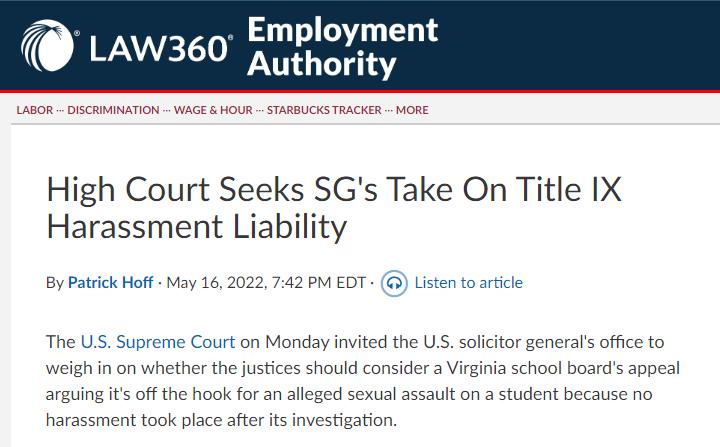
© 2022 Husch Blackwell LLP

Hall v. Millersville, 22 F.4th 397
(3rd Cir. Jan. 11, 2022)
• Student murdered in her residence hall room by her boyfriend who was not a student
• “The record shows that Millersville knew, and intended, for its Title IX policies to apply to nonstudents. Millersville's 2014 Title IX policy, which was in place while Karlie was enrolled, defined sexual misconduct to include sexual assault and intimate partner/dating violence, and also required that incidents of sexual misconduct be reported to Millersville’s Title IX Coordinator. More importantly, as admitted by Millersville's corporate designee, this policy cover[ed] all areas of University operations, programs, sites, and include[d] the conduct of employees, students, visitors/third parties” To be liable under Title IX, the
• Liability predicated on university having “substantial control over both the harasser and the context in which the known harassment occurs.”
© 2022 Husch Blackwell LLP

Brown v. State, 23 F.4th 1173 (9th
Cir. Jan. 25, 2022)
• Plaintiff, a former student at the University of Arizona, brought a complaint under Title IX after she was physically assaulted by Orlando Bradford, her boyfriend who was also a football player at the University, in his private, off-campus residence.
• In asserting deliberate indifference to her risk, plaintiff alleged that the University did not respond adequately to two prior incidents in which officials knew that Bradford had assaulted other women on campus.
• In sustaining summary judgment in favor of the University, the court held that plaintiff’s assertions about officials’ response to the prior incidents did not establish that the University had control over the context in which her abuse occurred. The majority also rejected the focus in the dissenting opinion on the facts that Bradford’s University scholarship paid for his rent and that Bradford needed the approval of a coach to live off campus. The majority held that these facts may be relevant to the University’s control of the abuser, but they do not address the separate requirement under Title IX that the University also control the context in which the harassment occurred.
© 2022 Husch Blackwell LLP

Tension Between Policy & Speech Rights

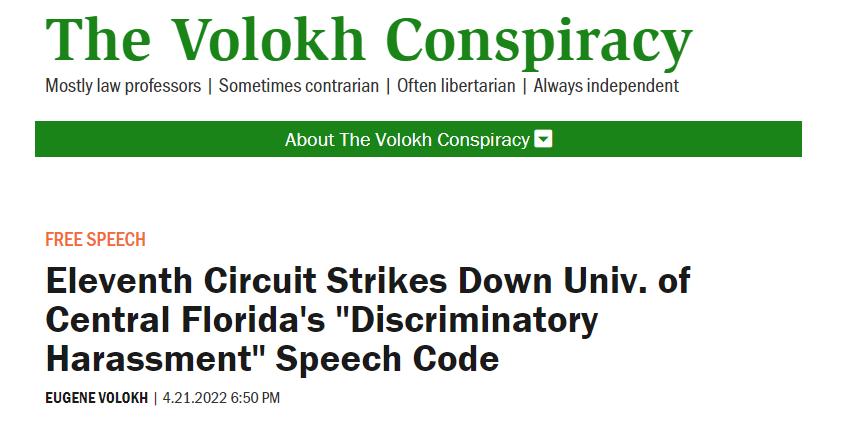
© 2022 Husch Blackwell LLP

Modest Uptick in Athletics Cases
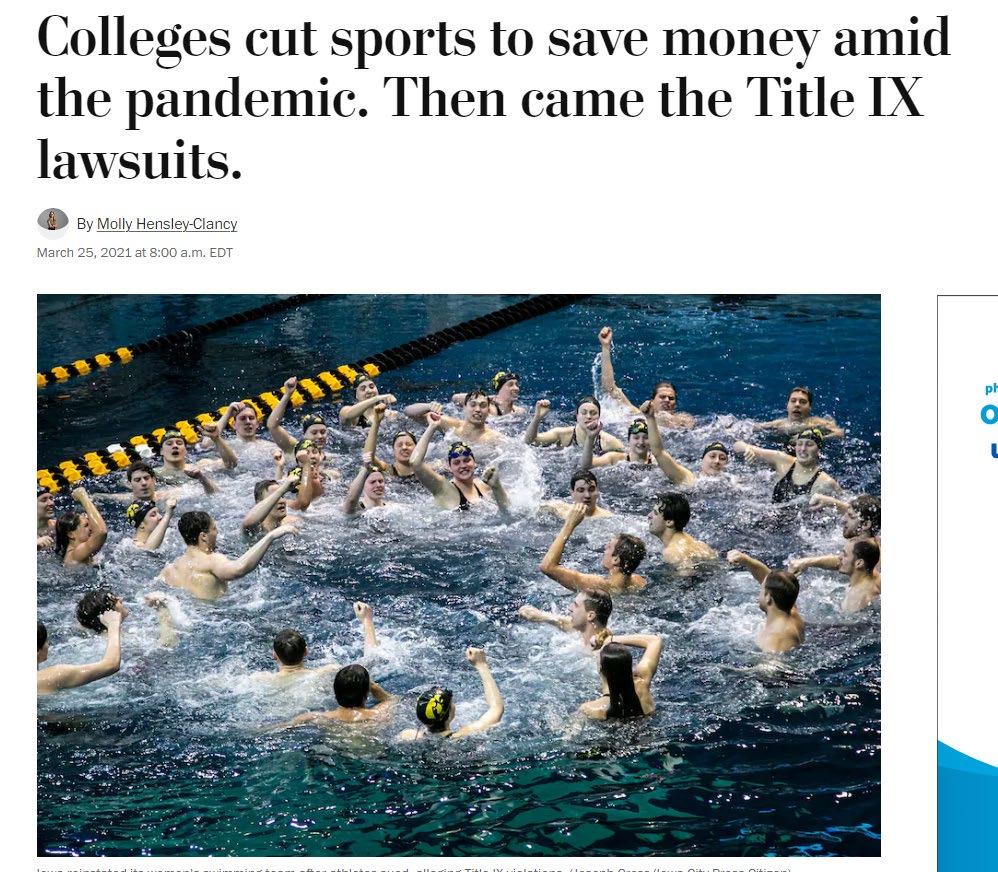

© 2022 Husch Blackwell LLP

Trends
1. On the whole, feels like courts are starting to rein litigation in (especially complainant litigation)
2. Onslaught of respondent litigation has slowed (Covid, Trump regs?)
3. Pivot to tort?
© 2022 Husch Blackwell LLP

Prior Criminal & Disciplinary History





THE BIG PICTURE IN TWO PICTURES


A BYGONE ERA?



“His release and return to society at the age of 33 — presumably with a long life still ahead of him — were mandated by law as well as by public policy, which have as their objectives rehabilitating and reintegrating former inmates in the hope that they will spend their future years productively instead of returning to crime. To this end, the value of education — both as an escape from society's underclass, and as a benefit to the public generally — is apparent.”


To ask or not ask?

Three national surveys of institutional admissions practices, conducted in 2009, 2010, and 2014 by separate research teams, indicate that 60 to 80 percent of private institutions and 55 percent of public institutions require undergraduate applicants to answer criminal history questions as part of the admissions process.
Unclear stats on prior disciplinary history


WHAT TO ASK?
Be specific about what must (and should not) be disclosed
Time limits?
Not arrests
Juvenile records?



IF YOU ASK, THEN WHAT?
1. Whatever process you come up, be sure you can (and do) follow it (the curse of assumed duties)
2. Establish forms and Process for securing additional information
3. Not for amateurs: Bit team/threat assessment matrix (appropriate training)
4. Does not have to be yes or no/Can we develop risk mitigation plans?
5. Appeal process
6. Periodic review for disparate impact

NCAA Policy – Where we are going (Expectations)

NCAA Sexual Violence Policy
The Policy requires member college and university chancellors or presidents, directors of athletics, and campus Title IX coordinators to annually attest that:

1. The athletics department is informed, integrated, and compliant with the following:
Institutional policies and processes regarding sexual violence prevention; and
Proper adjudication and resolution of sexual violence and interpersonal violence.

NCAA Sexual Violence Policy

2. Policies and processes are readily available within the department and provided to student-athletes, including:
Institutional policies and processes on violence prevention and adjudication; and
The name and contact information of the campus Title IX coordinator.
3. All student-athletes, coaches, and staff are educated on sexual violence prevention, intervention, and response each year.

The New Requirements

4. Collect annual disclosures from all incoming, continuing, and transferring student-athletes related to their conduct that resulted in discipline through a Title IX proceeding or a criminal conviction for sexual, interpersonal, or other acts of violence, and collect the same from transfer student-athletes if a Title IX proceeding related to their conduct is ongoing;
5. Take reasonable steps to confirm whether such student-athletes have been disciplined or criminally convicted of sexual, interpersonal, or other acts of violence; and
6. If recruiting incoming or accepting transfer student-athletes, have a written procedure that directs its staff to gather information from a former institution about any discipline or criminal conviction relating to any sexual, interpersonal, or other act of violence.

IPV Cases

The Beginning
• John Doe and Jane Roe attend Texas University where, after meeting during the fall of their freshman year, they began a steady, and steadily volatile, relationship.
• A mutual professor reported to the Title IX Coordinator that he was aware that arguments, sometimes violent, were common. During their first summer vacation, for example, Roe purportedly scratched and grabbed Doe's arm while traveling with Doe's family.
• Additionally, the professor reported to the University, the couple's penchant for physical altercations extended to intimacy, including “consensual choking” in Doe’s residence hall.
© 2022 Husch Blackwell LLP

Question 1
• How do you respond to this report?
• Obligations under federal or state law?
© 2022 Husch Blackwell LLP

Things Deteriorate
• Roe informed Doe she was dating others, and Doe called the relationship off.
• Except, it turned out, Doe had also been unfaithful. A revelation that did not sit well with Roe, which purportedly prompted Roe to spread rumors about Doe on campus.
• One such accusation: that Roe ended the relationship because Doe was physically abusive. And she threatened Doe directly via text: “take a year off and nothing will happen to you.”
© 2022 Husch Blackwell LLP

Question 2
• Concerned, Doe went to TU’s Director of Student Life.
• In an email, Doe complained that he was being harassed by his ex-girlfriend, who was “spreading false information.”
• Doe explained in the email that he “simply” did not “feel safe.”
• Q: How should Director of Student Life respond?
© 2022 Husch Blackwell LLP

Question 3
• Dean of Student Life recommended that Doe seek mental health services. He did not recommend that Doe file a Title IX complaint and did not make his own report.
• Concerns?
© 2022 Husch Blackwell LLP

Roe Reports
• Meanwhile, Roe met with TU's Director of Gender Equity and Title IX Administration. Roe told the Director that she was a victim of “Intimate Relationship Violence” under University policy and described certain incidents of abuse by Doe.
• Roe explained that she was not interested in pursuing further action.
• How should Director respond?
© 2022 Husch Blackwell LLP

No Contact Order
• Soon after, when Doe began a new relationship, Roe requested an order prohibiting Doe and Roe from any contact.
• Question: How do you respond?
• On the day the mutual order issued, Roe approached Doe on a campus running trail, attempting to apologize.
• Doe notified the University of the incident.
• How should University respond?
• Assume TU told Roe not to let it happen again.
© 2022 Husch Blackwell LLP

A Change in Plans
• A few months later, Roe notified the Director that she would cooperate with a Title IX investigation.
• A formal notice was issued, and Texas University barred Doe—but not Roe—from campus during the investigation.
• Concerns?
• Then, several months later, Doe accidentally “liked” one of Roe's social media posts, in violation of the Order. Doe immediately selfreported the mistake but, TU launched another disciplinary process that resulted in a reprimand and a written warning from a dean.
• Concerns?
© 2022 Husch Blackwell LLP

The Hearing
• TU appointed a three-person panel to investigate Roe's allegations against Doe, review the evidence they gathered, weigh the testimony they allowed and then decide whether the facts they found violated the TU Policy.
• At one of Doe's meetings with the Panel, he mentioned an interest in pursuing counterclaims against Roe.
• How should University respond?
© 2022 Husch Blackwell LLP

Decision
• The Panel's investigation culminated in a “Report” finding evidence to support the incidents of physical abuse alleged by Roe.
• Doe received a letter with the Panel's punishment: expulsion.
• Vindicated, Roe tweeted “my life is good again ... worked out boy problems that were never real problems just things I created.”
© 2022 Husch Blackwell LLP

What Happens Next?
• Lawsuit
• What claims?
© 2022 Husch Blackwell LLP

(3rd Cir. Mar. 31, 2022)
• 3rd Circuit found that plaintiff’s factual assertions regarding the University’s different handling of his and his accuser’s misconduct reports and order violations, together with his assertion that the Department of Education’s 2011 Dear Colleague Letter created external pressure to which the University had yielded, were sufficient to permit his Title IX discrimination claim to proceed.
• 3rd Circuit also found plaintiff’s factual allegations sufficient to permit his breach of contract and breach of implied covenant of good faith and fair dealing claims to proceed.
© 2022 Husch Blackwell LLP
30 F.4th 335
Doe v. Princeton Univ.,

A Reminder Though . . .

© 2022 Husch Blackwell LLP

Big Picture Takeaways
1. Involve campus or external experts in IPV cases (experts trained to recognize the full array of domestic-violence signifiers).
2. Significance of face-to-face meeting.
3. Resources for students.
4. Importance of coordinated, working institutional relationship.
5. Report to BIT.
6. Lethality Assessment
© 2022 Husch Blackwell LLP

Avoiding System Failure




© 2022 Husch Blackwell LLP


• “Are we as college leaders prepared to respond appropriately should evidence of wrongdoing appear on our campus?”
• “Will we be willing to stand up for what is morally right to protect potential victims of maltreatment, rather than reflexively reacting in a way that maximizes the interests of our institutions?”
• “These are questions that should be asked by all of us in leadership positions: presidents, provosts, board members, athletic directors, and university lawyers. None of us should be so naïve as to think that what happened at Penn State and Michigan State could not happen again.”


1. Are individual institutional players motivated to “maximize the interests of their institutions” or are they motivated to maximize their own personal interests within a large organization?
2. Does this ring true to you: that [fill in the name here] is willing to cover for a known pedophile to advance institutional or personal interests?
3. Reframe: why do well-intentioned, smart, skilled people who are willing to “stand up for what is morally right” occasionally reach the clearly wrong conclusion or do the clearly wrong thing.
IMHO, this requires a serious conversation about the common human frailties which impact all of us.





Why Did the Investigator Get It Wrong?
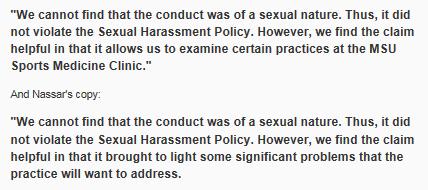


• "Nassar stated he is not saying he did not touch (Thomashow)," Capt. Valerie O'Brien, who at the time was a detective, wrote in the report. "Nassar stated he purposely touched her there. Nassar stated he has been doing this since 1997. 'What now, what happened?' “
• Nassar began sending O'Brien emails, videos and references to other doctors who performed similar procedures.
• University police submitted a warrant request for a 4th-degree criminal sexual conduct charge, a misdemeanor. Prosecutors denied the charges and said what Nassar did appeared to be "a very innovative and helpful manipulation.”

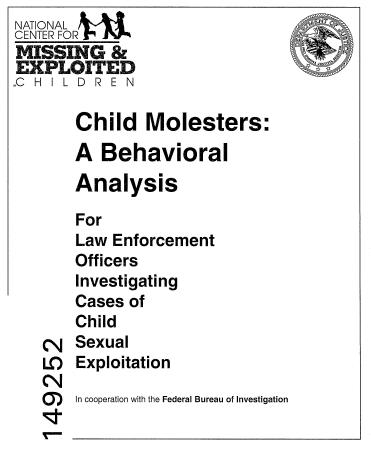
“In view of the fact that many people still believe in the myth that child molesters are ‘strangers’ or misfits of society, this tactic can unfortunately be effective.”
•
•
10% of children were abused by a total stranger
30% of children were abused by a family member
• 60% were abused by an adult they knew who was not a family member
•

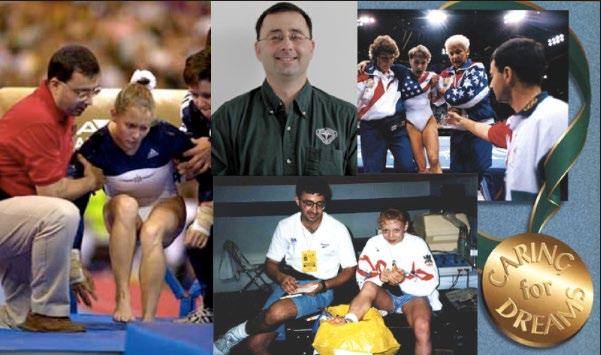
Profiling Serial Child Sex Abusers
• Male and over 30 years of age
• Single or with few friends in age group
• Works in jobs with access to children
• Engages in activities with children, often excluding other adults
• Seduces with attention, affection, and gifts
• Has hobbies and interests appealing to children
• Popular with both children and adults
• Appears to be trustworthy and respectable -- has good standing in the community.
• Almost always collects child pornography or child erotica
Confronted: How Do Serial Abusers
Respond?
1. Denial. “The offender may act shocked, surprised, or even indignant about an allegation of sexual activity with children . . . He might admit to an act but deny the intent was sexual gratification: ‘Is it a crime to hug a child?’ He may imply that his actions were misunderstood, and a mistake has been made. His denial may be aided by relatives, friends, neighbors, and coworkers. These associates may be uncooperative and may even hinder police investigation of the offender.”
2. Minimization. “If the evidence against him rules out total denial, the offender may attempt to minimize what he has done, both in quantity and quality. He might claim that it happened on one or two isolated occasions or that he only touched or caressed the victim. He might admit certain acts, but deny they were engaged in for sexual gratification.”
Confronted: How Do Serial Abusers
Respond?
3. Fabrication. “Some of the more clever child molesters come up with ingenious stories to explain their behavior. One offender, a doctor, claimed he was doing research on male youth prostitution. A professor claimed he was doing research on pedophilia and collecting and distributing child pornography for scientific research. A teacher said that his students had such a desperate need for attention and affection that they practically threw themselves at him and misunderstood his affection and response as sexual advances . . . In another case, a nursery school operator, who had taken and collected thousands of photographs of young, nude or seminude children in his care, claimed they were not for sexual purposes; he simply admired the anatomy of children.”
Confronted: How Do Serial Abusers Respond?
4. Sympathy. “Pedophiles may resort to a ‘nice guy defense.’ In this defense, the offender expresses deep regret and attempts to show he is a pillar of the community, a devoted family man, a military veteran, a church leader, nonviolent, without prior arrests, and a victim of many personal problems. In view of the fact that many people still believe in the myth that child molesters are ‘strangers’ or misfits of society, this tactic can unfortunately be effective. Many traits introduced by the offender as evidence of his good character (i.e., dedication to children, volunteer work, etc.) in fact contribute to his ability to access and seduce children.”
Solomon Asch: Social Proof
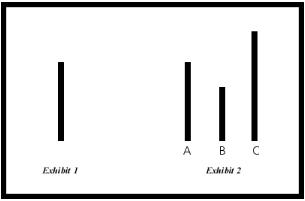





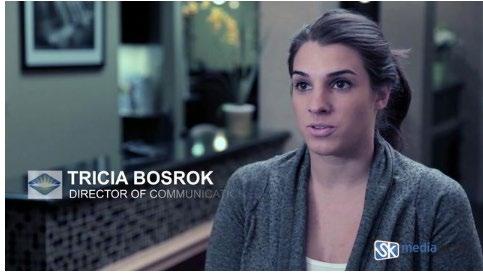
Social Proof
• People will conform to the actions of others under the assumption that those actions are reflective of the correct behavior.
• It is especially prevalent in ambiguous situations and when there are other people who are perceived to be particularly knowledgeable about a situation.
• Social proof works through our very human need to belong, to be respected by others and to avoid social punishment such as ridicule or ostracism for taking a position apart from the herd.


Civil Rights Investigators Cannot Be “People
Pleasers”
• Who gets promoted and why?
• Role of Title IX investigator: “voice of institutional cognitive independence.” ~ legal ethicist Donald Langevoort.
• You are a bearer of bad news.
• Be mindful of normative influences (like social proof) and nevertheless reach unpopular decisions based on your own personal knowledge, your own rigorous analysis, and a thorough gathering of valid and factual information.
• Institutions must reflect on whether prioritizing things like collegiality over cognitive independence (and the attendant upset that occasionally comes with it) in evaluating performance creates environments where people avoid reaching difficult conclusions which could rock the proverbial boat.




Selective Attention
• Attention is a limited resource, and what has been dubbed “selective attention” allows us to tune out details that we think are unimportant and focus on what really matters.
• The more that is going on, the more likely it is that busy people are missing the significant gorilla dancing in the room.
• Reasonable caseloads are not only a quality-of-life issue – they are a quality-of-investigation issue.
Lessons
• We can continue to frame this as a battle of good versus evil and I suspect we will continue to make the same mistake
• Reaching the correct conclusion requires us to know what we are looking for, know how to meaningfully investigate in this space, and to recognize the human frailties that afflict us all and sometimes present us from reaching the correct conclusion


































































































